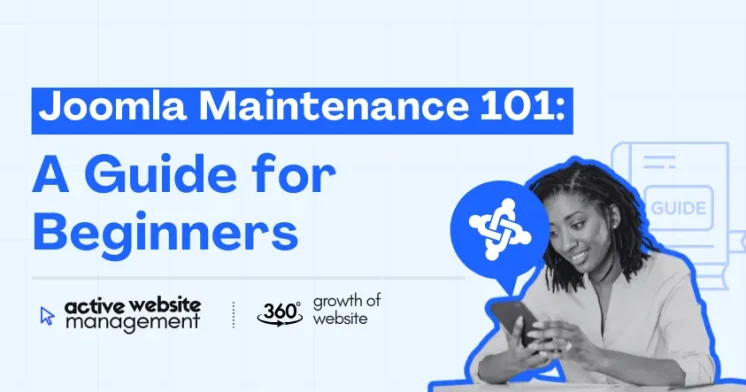October 31, 2024
5 min read
Maintaining a Joomla website is essential for ensuring performance, security, and user satisfaction. Joomla’s powerful content management system (CMS) allows users to create highly customizable sites, but it requires regular upkeep. For those new to Joomla maintenance, this guide covers every essential aspect.
1. Why Joomla Maintenance is Important
Regular Joomla maintenance prevents vulnerabilities, enhances site performance, and keeps your site running smoothly for users. Without maintenance, a Joomla site can suffer from slow load times, security risks, outdated content, and low search engine rankings. A consistent maintenance plan ensures your site remains safe, up-to-date, and user-friendly.
2. Setting Up Regular Backups
Regular backups are crucial. With Joomla, backup solutions can range from simple extensions like Akeeba Backup to manual FTP and database backups.
- Frequency: Ideally, back up weekly or before any major updates.
- Storage: Store backups offsite using cloud storage solutions to ensure accessibility in case of a server failure.
- Restoration Process: Familiarize yourself with restoring backups to minimize downtime in emergencies.
3. Keeping Joomla Core Updated
Joomla frequently releases core updates to patch security vulnerabilities and improve functionality. Staying updated is critical for security and compatibility with extensions.
- Automatic Updates: Enable automatic notifications or set reminders to check for updates.
- Testing: Always test updates in a staging environment before applying them to your live site.
Don’t Just Maintain Your Website—
Grow It using Active Website Management! Don't Wait for Growth—Accelerate It with Active Website Management
4. Updating Extensions and Plugins
Extensions and plugins in Joomla can introduce vulnerabilities if they’re outdated.
- Regularly Check for Updates: Enable email notifications or monitor your Joomla admin dashboard.
- Review for Compatibility: Only use extensions that are compatible with the latest Joomla version.
- Remove Unused Extensions: Deactivate and uninstall extensions that you’re no longer using to reduce security risks.
5. Monitoring and Enhancing Site Security
Website security is crucial in protecting user data, maintaining trust, and avoiding penalties. Joomla provides several tools and best practices for security:
- Set Strong Passwords: Ensure all user accounts have strong passwords and consider implementing two-factor authentication (2FA).
- Limit Admin Access: Only grant access to trusted users and consider limiting login attempts.
- Install a Security Extension: Joomla extensions like RSFirewall and jSecure Authentication add layers of protection to your site.
Slow websites frustrate users and negatively impact SEO. Joomla has built-in options and extensions to optimize site speed:
- Enable Caching: Joomla’s built-in caching system reduces page load times by storing a version of your pages.
- Image Optimization: Use compressed images and Joomla’s lazy loading options.
- Minimize HTTP Requests: Limit the number of images, scripts, and CSS files.
7. SEO Maintenance Tips
Maintaining your SEO rankings requires periodic adjustments, especially as search engines change their algorithms.
- Keyword Research: Regularly update your keyword strategy using tools like Google Keyword Planner.
- Optimize Meta Descriptions and Titles: Update page titles and descriptions to stay relevant.
- Use SEF URLs: Ensure URLs are readable and optimized for keywords.
8. Fixing Broken Links and Error Pages
Broken links harm user experience and SEO. Regularly scan your Joomla site for broken links.
- Use Link Checkers: Tools like Screaming Frog or Google Search Console can identify broken links.
- Custom 404 Page: Create a custom 404 error page that guides users back to relevant pages on your site.
9. Database Maintenance
Joomla stores data in a database that requires occasional cleanup.
- Optimize Tables: Joomla allows database optimization from the backend.
- Clear Cache: Regularly clear cache files to prevent database overload.
- Delete Unused Data: Remove any old data or backups that could slow down the database.
10. Regular Content Updates
Regularly updating content shows users and search engines that your site is active and relevant.
- Blog Updates: Publish new blog posts, especially those targeting popular search terms.
- Product Information: Ensure product pages have the latest information.
- User Engagement: Encourage comments and feedback, as engagement signals quality content to search engines.
Monitoring site health is easy with Google Search Console and other SEO tools. Here’s how to leverage them for Joomla maintenance:
- Performance Monitoring: Check search traffic and click-through rates.
- Indexing Status: Ensure all important pages are indexed.
- Fix Mobile Usability Issues: Address any mobile usability warnings to improve user experience.
12. How Active Website Management (AWM) Can Help with Joomla Maintenance
Active Website Management (AWM) is a custom service that combines performance optimization, security monitoring, and content upkeep for Joomla sites. It provides a comprehensive solution for hands-on management, ensuring your site remains secure and performs optimally.
With AWM, Joomla users can rely on a team to manage:
- Core and Extension Updates: Our team manages core and extension updates, testing them before applying to avoid compatibility issues.
- Enhanced Security Monitoring: Routine security scans help mitigate potential vulnerabilities.
- Performance Audits: We conduct regular audits to optimize speed and user experience.
- Content Refreshing: Content updates are managed to align with search trends, keeping your site relevant.
Using Google Search Console insights and custom monitoring, AWM ensures that your Joomla website is maintained to the highest standards, maximizing security, performance, and SEO.
Don't Wait for Growth—Accelerate It with
Active Website Management Don't Wait for Growth—Accelerate It with Active Website Management
Conclusion
Regular Joomla maintenance keeps your website secure, fast, and relevant. Whether you’re handling backups, updates, security, or SEO, following these steps ensures your Joomla site delivers a seamless experience to visitors. By incorporating tools like Google Search Console and using professional services like Active Website Management (AWM), you can keep your Joomla website running smoothly, allowing you to focus on growing your business.

